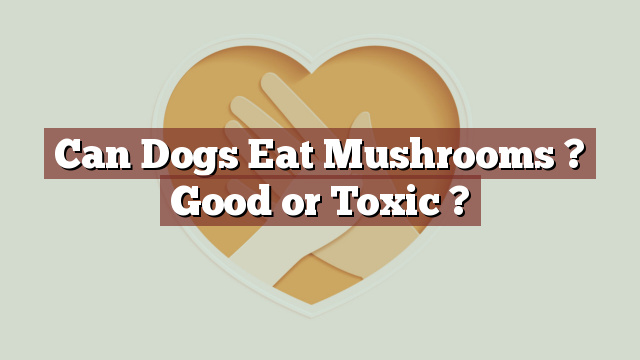Can Dogs Eat Mushrooms? Good or Toxic?
As responsible pet owners, it is crucial to be aware of what foods are safe and healthy for our furry friends. One such food that may raise questions is mushrooms. Mushrooms come in various shapes, sizes, and flavors, but can dogs safely consume them? In this article, we will explore the nutritional value of mushrooms for dogs, their safety, potential risks and benefits, and what to do if your dog happens to consume mushrooms.
Nutritional Value of Mushrooms for Dogs
Mushrooms are known for their rich nutritional profile, which includes essential vitamins and minerals. They are a great source of potassium, copper, selenium, and B vitamins. Additionally, mushrooms are low in fat and calories, making them an appealing choice for dog owners looking to add variety to their pet’s diet.
Are Mushrooms Safe or Toxic for Dogs?
It is important to note that not all mushrooms are safe for dogs to consume. While some species of mushrooms are harmless, others can be highly toxic and even fatal. The challenge lies in distinguishing between safe and toxic mushrooms, as it can be quite difficult for the average person to identify them accurately.
Several species of wild mushrooms contain toxins that can cause severe health issues in dogs. These toxins may lead to symptoms such as gastrointestinal upset, liver damage, kidney failure, hallucinations, seizures, and even death. It is safer to assume that mushrooms found in your yard or during walks should be considered toxic until proven otherwise.
Potential Risks and Benefits of Dogs Eating Mushrooms
The potential risks associated with dogs consuming toxic mushrooms are significant. Even a small amount of some poisonous species can result in serious health consequences. It is crucial to understand that toxicity levels can vary among mushroom species, and the severity of symptoms can differ depending on the dog’s size and overall health.
On the other hand, safe and properly prepared mushrooms can offer certain health benefits to dogs. As mentioned earlier, mushrooms are a good source of essential nutrients and vitamins. They can contribute to a healthy immune system, improve digestion, and provide antioxidants. However, it is essential to consult with a veterinarian before introducing mushrooms into your dog’s diet to ensure they are safe and beneficial for your specific pet.
What to Do If Your Dog Eats Mushrooms
If you suspect that your dog has consumed mushrooms, take immediate action. Remove any remaining mushrooms from their reach, and if possible, take note of the mushroom’s appearance and location. Contact your veterinarian or a 24-hour animal poison control hotline for guidance. Do not induce vomiting or administer any home remedies without proper veterinary advice. Every minute counts in such situations, and it is always best to consult a professional to ensure the safety and well-being of your pet.
Conclusion: Proceed with Caution When Feeding Mushrooms to Dogs
In conclusion, while mushrooms can offer nutritional benefits to dogs, it is crucial to exercise utmost caution when it comes to their consumption. Not all mushrooms are safe for dogs to eat, and the potential risks associated with toxic mushrooms can be severe. If you are unsure about the safety of a mushroom, it is best to err on the side of caution and keep it away from your furry companion. Ultimately, consulting with a veterinarian is the most reliable way to determine if mushrooms are safe and suitable for your dog’s dietary needs.
Thank you for investing your time in exploring [page_title] on Can-Eat.org. Our goal is to provide readers like you with thorough and reliable information about various dietary topics. Each article, including [page_title], stems from diligent research and a passion for understanding the nuances of our food choices. We believe that knowledge is a vital step towards making informed and healthy decisions. However, while "[page_title]" sheds light on its specific topic, it's crucial to remember that everyone's body reacts differently to foods and dietary changes. What might be beneficial for one person could have different effects on another. Before you consider integrating suggestions or insights from "[page_title]" into your diet, it's always wise to consult with a nutritionist or healthcare professional. Their specialized knowledge ensures that you're making choices best suited to your individual health needs. As you navigate [page_title], be mindful of potential allergies, intolerances, or unique dietary requirements you may have. No singular article can capture the vast diversity of human health, and individualized guidance is invaluable. The content provided in [page_title] serves as a general guide. It is not, by any means, a substitute for personalized medical or nutritional advice. Your health should always be the top priority, and professional guidance is the best path forward. In your journey towards a balanced and nutritious lifestyle, we hope that [page_title] serves as a helpful stepping stone. Remember, informed decisions lead to healthier outcomes. Thank you for trusting Can-Eat.org. Continue exploring, learning, and prioritizing your health. Cheers to a well-informed and healthier future!

